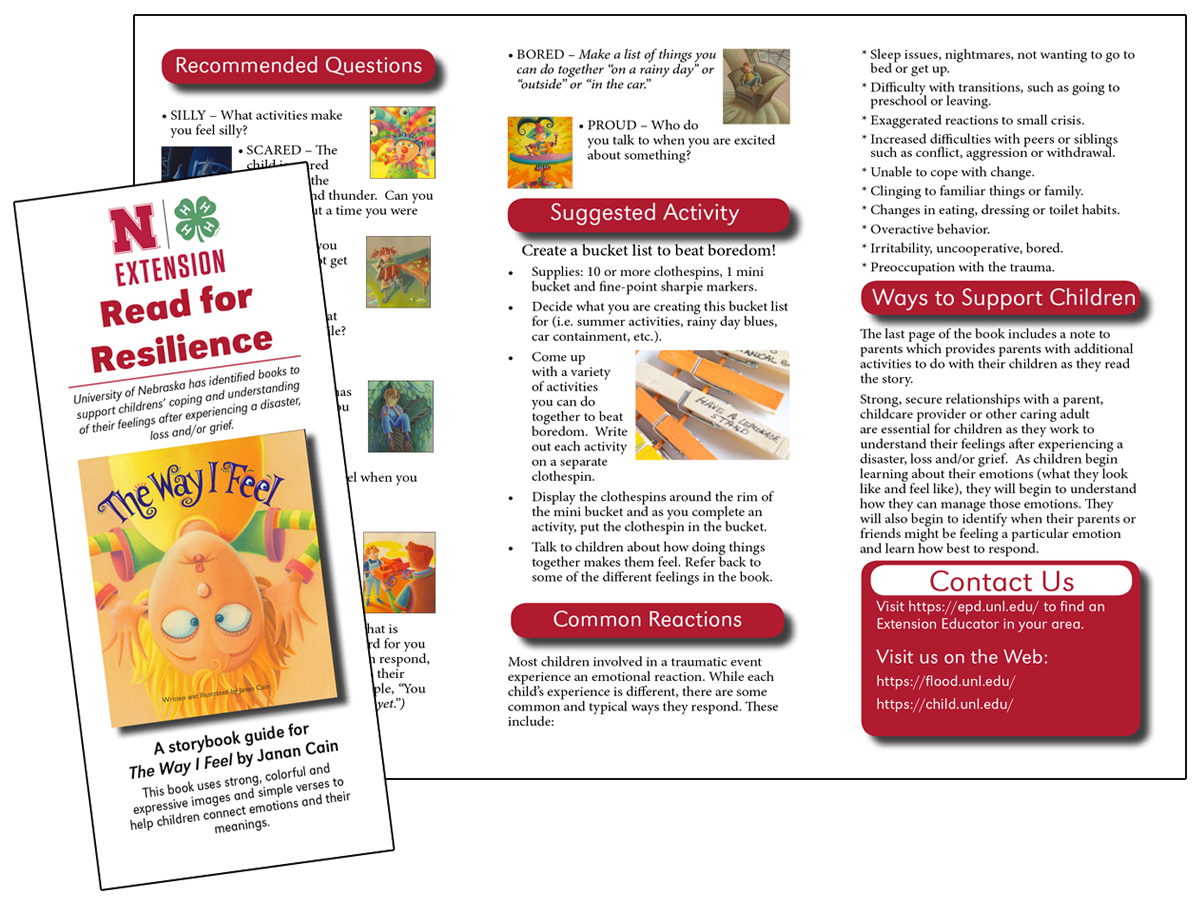
By Jaci Foged, Extension Educator, Lancaster County
March 13, 2019 will be a day many Nebraskans will not soon forget. It was furiously raining in eastern Nebraska and there was a winter storm with high winds and blizzard conditions in western Nebraska. Nebraska had damage not only from high water levels, but in many areas there was damage due to the break-up of river ice. Many animals were stranded at their homes while families fled for higher ground. The Federal Emergency Management Agency (FEMA) is predicting it will be over nine years before Nebraskans recover from these disasters.
Since March 13, several communities in Nebraska have received historic rainfall along with damaging winds. Residents continue to work together as they recover from severe weather events.
HELPING CHILDREN COPE WITH DISASTER
If you or someone you know was directly involved in this disaster, you probably have experienced a wide range of emotions. Like adults, young children may have difficulty expressing their feelings, which may lead to difficulties with coping and understanding their feelings. Young children may exhibit intense emotions and engage in challenging behaviors while others may have separation anxiety, bed-wetting or be very quiet.
In supporting young children with these different reactions and feelings, it is important for adults to remain calm and approach behaviors in a thoughtful way. Parents and childcare providers are in the best position to help young children cope. It is in our calm that children learn how to respond during difficult situations.
A particularly engaging way to help young children understand their feelings and reactions is with storybook reading. Using children’s literature in an interactive way can help children heal by better understanding their experiences (Betzalel and Shechtman, 2010) and can improve their coping skills (Burns-Nader & Hernandez-Reif, 2016; Nicholson & Pearson, 2003; Pola & Nelson, 2014). Additionally, it provides the parent or caregiver with tools to increase their own understanding of how young children may experience traumatic events such as natural disasters.
EXTENSION CREATES READ FOR RESILIENCE PROGRAM
In response to the March 13 disasters, Nebraska Extension’s The Learning Child team created the Read for Resilience program. The team identified nine children’s books to support their coping and understanding feelings after experiencing a disaster, loss and/or grief. Then team members developed reading guides to accompany the books to provide parents and caregivers with age-appropriate probing questions to explore children’s thoughts and feelings. The guides also include suggested activities to further extend children’s ability to process their feelings and experiences. Parents and caregivers of youth can receive up to five free books through this program (approximately a $100 value).
To request a free book or to download a storybook guide, please visit http://child.unl.edu/read4resilience, complete a short survey and select the book(s) which meets your child’s need.
Holly Hatton-Bowers and Amy Napoli, assistant professors of child, youth and family studies and early childhood Extension specialists, are the lead organizers of this program. Team members include Lynn DeVries, Jaci Foged, Carrie Gottschalk, Lisa Poppe, Lee Sherry, Jackie Steffen, LaDonna Werth, Tasha Wulf, Karen Wedding and Kathleen Lodl.
One person who requested books wrote, “Thank you, thank you for your support for our children! We have a 6-year-old daughter and a 2-year-old daughter. We have noticed through conversation and drawing with our 6-year-old that she has been affected by the flooding. The books will assist us greatly in helping our daughters understand the impact the flood has had on our family and reassurance that they are safe. I still have a picture that our 6-year-old drew of a child surrounded by water and she told me that she prayed for ‘all the flooding’ in school that day.”
To ensure that this program continues, The Learning Child team is accepting monetary donations which can be given through the 4-H Foundation at http://go.unl.edu/r4rdonate. These donations will be used to purchase books so parents and caregivers receive them at no charge.
One donor wrote, “It is such a great project and great work you all are doing.”
FOR MORE INFORMATION
• Nebraska Extension has compiled several disaster response resources for parents and caregivers of youth at https://child.unl.edu/disaster.
• See article in this e-newsletter, “Prepared, Not Scared. Be Ready for Disasters,” for suggestions how to prepare for disasters.